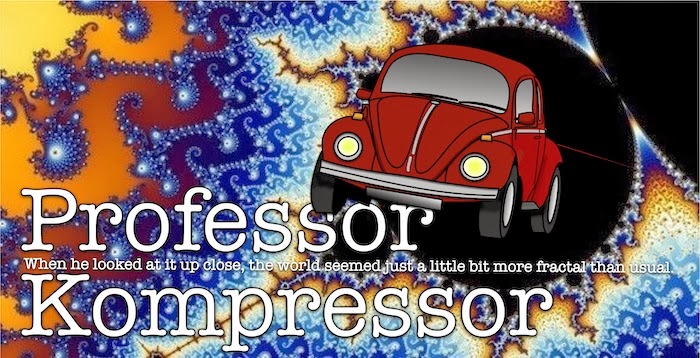If you are not a UK academic you have probably missed this, but today was the deadline for submission to an exercise gloriously called Research Excellence Framework 2014. Basically, a beauty contest for UK universities where we already know the winners. Still important because it determines how research money is shared among the losers. For the last two years or so I have had the "pleasure" of coordinating one of these submissions. It has involved numerous internal benchmark exercises, external reviews, a lot la-di-da meetings and, most exciting of all, a set of Impact Case Studies. There are supposed to show how awfully important our research is for the rest of society and how we are helping to fix the economy (after the bankers broke it).
As a bit of light relief, I have written a short story on impact. Some of you might be entertained by it, so I decided to share it. The idea was to ask how the character from my children's books, Prof Kompressor, would react if asked to provide evidence of impact. This is for everyone out there that had to engage with REF2014 and all those that are dreading something similar coming your way.
Enjoy!
_______________________________________
The
wrong kind of impact
It was the most peculiar letter. He had to
read it several times to make sense of it. His old mentor from college,
Professor B.R. Ainsworth, was asking for help. Apparently it was a matter of
impact or, more precisely, the lack of it.
“Dear Professor,” the letter started.
“I am sorry to bother you but we really
could do with some assistance. The Government has decided that it is time to
measure the usefulness of our research and we need to demonstrate that our work
has impact on the world outside the laboratory. As you will appreciate, this is
not so easy seeing as we are exploring the fundamental nature of space and
time. Anyway, I know you have used some of our ideas for your inventions and I
was rather hoping you might be able to help us by providing a useful Impact
Case Study.”
“Impact what study?” reacted the Professor.
The more he thought about it, the clearer it
became that his friend and his team of brainy scientists were in real trouble.
There is not much money to be made from black holes, and wonky time does not
help solve many real life problems either. He would like to help, but what
could he possibly do?
As he tried to figure this out, the
Professor made himself a nice cup of tea. Three lumps of sugar and a splash of
milk, as usual. He brought the drink into the inventing studio to refresh his
memory. Where had he actually used Professor Ainsworth’s ideas?
The first thing that came to mind was the
time when he tweaked gravity to make a black hole into a bin. He shuddered as
he remembered the chaos as the black hole ended up extremely hot and the house
almost melted. This was some kind of impact, but obviously not the right kind.
Besides, this invention was quite temperamental so it was probably best to keep
it secret.
He had used Professor Ainsworth’s idea of a
multiverse when he tried to solve the problem of global warming by tapping into
a colder Earth in a parallel universe. If this had worked as intended it might
have had exactly the kind of impact the scientists were looking for.
Unfortunately, the plan had backfired and all he had ended up with was
frostbite. The wrong kind of impact entirely.
Then there was the design of the flying car,
where he had used efficient batteries based on Professor Ainsworth’s work on
supracapacitors.
“That’s more like it,” decided the
Professor, rubbing a bump on his head that was left as a reminder of the first
test flight.
At least this invention worked.
He could not claim to have made any money on
it, though. Mainly because he had kept the blueprints to himself. It worried
him that flying cars might wreak havoc in the skies. People seemed to have
trouble staying safe on the roads so what would happen if they could choose to
go up and down as well? It might lead to the kind of impact he would rather not
think about.
The Professor could not help smiling as he
recalled the wintery night when his flying invention had proved its worth.
Surely, helping Father Christmas when his sled had broken down, making sure
that children all around the world got their presents, would have to count as
impact on the real world?
“The only problem is,” he frowned, “it might
be a bit tricky to provide convincing evidence.”
“I guess I could try to get a supporting
letter from the North Pole...”
The Professor admitted defeat with a heavy
sigh. He was an excellent inventor, and his inventions were often excellent,
but they all seemed to have the wrong kind of impact.
_______________________________________
Two of the ideas, fixing global warming and the black-hole bin, come from Professor Kompressor goes environ-mental, which just happens to be free from Amazon this weekend:
The flying car was invented and used to save Christmas in the first book, Professor Kompressor, which also happens to be free but this time from ibooks:

No comments:
Post a Comment